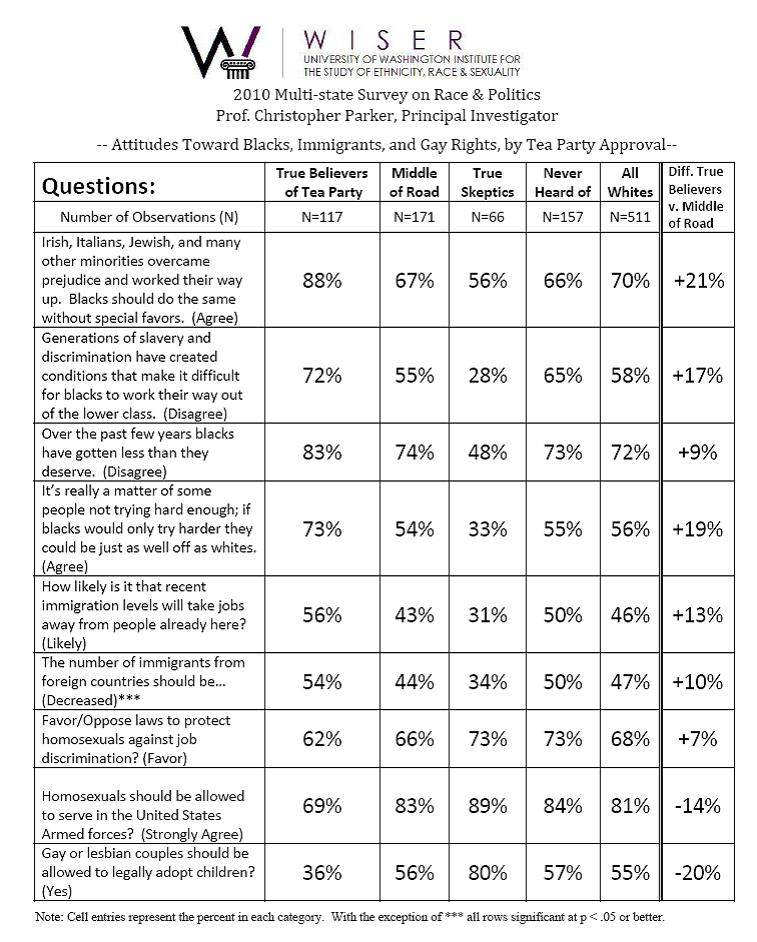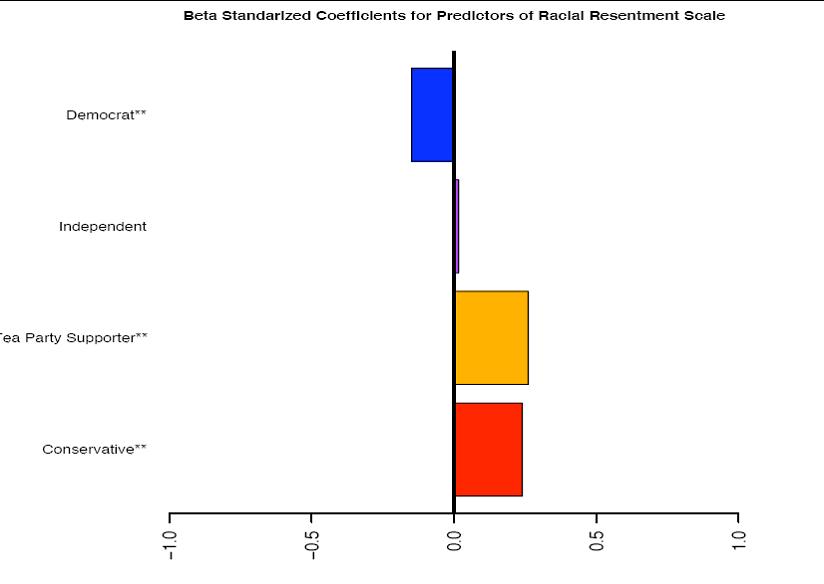The recent vote by NAACP delegates in favor of a resolution “to condemn extremist elements within the Tea Party” and “calling on Tea Party leaders to repudiate those in their ranks who use racist language in their signs and speeches” has, predictably, refocused attention among the punditcrats on an issue that we have discussed several times before on this blog. But the most recent batch of commentary is, in my view, missing the real story.
To see why, I want to begin with a 7-state study conducted by Chris Parker and his colleagues at Washington University designed to measure the racial attitudes of Tea Party supporters compared to other groups. (Thanks to Bob Johnson for asking me to comment on the Parker study.) The Parker findings are based on a probability sample, consisting of 1006 cases stratified by states that were chosen because six of them were “battleground” states in 2008. I urge you to look at Parker’s results using the link above, but here are some highlights, as summarized in this table:
 What do we make of these findings, including the significant difference in the racial views of Tea Partiers versus non-Tea Partiers, including the “middle of the road” respondents? Note that Parker and his colleagues reject the argument made by some conservatives that racial “resentment” is largely a function of ideology, as opposed to racial views. When they construct an “index” of racial resentment based on answers to these survey questions, and run a regression, they find that being a Tea Party member is a significant predictor of adopting an attitude of racial resentment, even when controlling for ideology and partisanship, as indicated in the following figure.
What do we make of these findings, including the significant difference in the racial views of Tea Partiers versus non-Tea Partiers, including the “middle of the road” respondents? Note that Parker and his colleagues reject the argument made by some conservatives that racial “resentment” is largely a function of ideology, as opposed to racial views. When they construct an “index” of racial resentment based on answers to these survey questions, and run a regression, they find that being a Tea Party member is a significant predictor of adopting an attitude of racial resentment, even when controlling for ideology and partisanship, as indicated in the following figure.
They conclude, “[E]ven as we account for conservatism and partisanship, support for the Tea Party remains a valid predictor of racial resentment. We’re not saying that ideology isn’t important, because it is: as people become more conservative, it increases by 23 percent the chance that they’re racially resentful. Also, Democrats are 15 percent less likely than Republicans to be racially resentful. Even so, support for the Tea Party makes one 25 percent more likely to be racially resentful than those who don’t support the Tea Party.”
I have some concerns about this study. To begin, I am uncomfortable with the wording of some of the survey questions themselves and whether they are really tapping into “racial resentment” or some other policy dimension. Clearly some of these concerns, such as attitudes toward immigration, have an economic component.
Other questions are asked in ways that are likely to skew results (although not necessarily differences in response rate by subgroup.) For example, question one asks respondents to compare the histories of Irish, Italians and Jews with blacks in their ability to overcome prejudice and work their way up “without special favors.” There’s a large body of survey research that shows that when you include “hot button” words like “special favors” or “quotas”, or anything similar that suggests preferential treatment for one group as opposed to another, support for the policy in question goes down. Thus it doesn’t’ surprise me that more than half of those who are skeptics of the Tea Party movement nevertheless agree that blacks should overcome discrimination “without special favors.”
Partly because of my concerns over question wording, and uncertainty regarding just what these questions are measuring, I also wish Parker did not report only the results based on using an index of “racial resentment” as his dependent variable when trying to gauge the relative importance of Tea Party support, ideology and partisanship on holding racially resentful views. Instead, I wish he had shown the regression results for partisanship and ideology and Tea party membership for each of the nine survey questions. That would more clearly show, I think, just what element in the “racial resentment” index most clearly differentiates Tea Partiers from other groups.
Finally, one might have also preferred that his regression predicting whether one holds racially intolerant views controlled for some basic demographic variables (age, gender, income, etc) that might influence results. Had he done so it is possible that some of the effects he attributes to being a Tea Party member will wash out. In Parker’s defense, however, he’s working with such small subsamples that it may be difficult to estimate more detailed regressions.
These methodological issues aside, there’s an additional reason for my uncertainty in evaluating Parker’s findings: they seem to contradict the results of other surveys, including these findings by ABC survey analyst Gary Langer. Langer analyzes a survey of Tea Party supporters and non-Tea Partiers and concludes: “Ultimately, a statistical analysis indicates that the strongest predictors of supporting the Tea Party are views of Obama, ideology, partisanship and anger at the way the government is operating. Views on the extent of racism as a problem, and views on Obama’s efforts on behalf of African-Americans, are not significant predictors of support for the Tea Party movement.”
At first glance, Langer’s results seem to oppose Parker’s. What explains the difference? I can’t be sure, in part because when I link to the study Langer cites, he presents the results but not the actual regression analysis. So I don’t know what regression he actually ran, or the coefficients, etc.
Of course, both analysts could be right because they are not, strictly speaking, measuring the same thing. Langer is trying to predict what factors contribute to a decision to support the Tea Party, and concludes that racial views (however he defines this) is not one of them. Parker is trying to explain whether one holds views suggesting “racial resentment” and concludes that being a member of the Tea Party is a statistically significant predictor of having this attitude.
These methodological concerns notwithstanding, I think Parker’s results showing the differences in racially-oriented views between these subgroups is very provocative, and it is as good as I have seen on this topic. Until better or more detailed surveys come around, it certainly deserves the coverage it has received (see here and here). But I think this coverage, such as the commentary by E.J. Dionne and Charles Blow – indeed, almost everyone who has commented on Parker’s results – are missing the real significance of his findings. Let us assume for the sake of argument that the results in the table above should be taken at face value. Look more closely at the differences not just between Tea Partiers and “middle of the road” respondents (however they may be defined). Look also at the difference in views between the middle of roaders and the Tea Party “skeptics.” If you compare the differences, you find that for seven of the nine questions, the middle of the roaders’ view are as close or closer (keeping in mind the 3% margin of error in the responses) to those of the Tea Party than they are to the Tea Party skeptics! On three questions, middle respondents are much closer to the Tea Party, while on two they are closer to Tea Party skeptics. On the remaining four they are equally close to either set of outliers – Tea Partiers or Skeptics.
Why is this important? Because when moderate voters (that is, Parker’s middle of the roaders) go to the polls, they don’t get to vote for their favorite centrist policy – they choose among two candidates, neither of whom may share their more moderate views. Parker’s results suggest that, given a choice between a racially resentful Tea Party candidate or one who runs on the Tea Party skeptics’ racial views, they may be more likely to support the Tea Party candidate. Keep in mind that the partisan purists on both end of the spectrum are the ones who are not easily persuaded to cross party lines and vote for the other candidate. It is the middle of the roaders who are most willing to do so.
Moreover, this is based only on a survey that focuses on racial issues. It is not a stretch to imagine that on economic issues – jobs, government spending, the deficit – moderates may skew even more toward the Tea Party candidate if she’s opposed by a Democrat who voted in favor of the stimulus package, the Obama health care bill, and the bank bailout.
This is something Sarah Palin has grasped much more quickly than the other Republican candidates: in a highly polarized environment in which support for the party in charge is dwindling, you don’t have to be in the center on all the issues – you just have to be the last opposition candidate standing when the voters opt for “change”. Look no further than Barack Obama to see the wisdom in this strategy.
In the current political climate, that may mean hitching one’s wagon to the Tea Party movement. Palin has come closest of all the Republicans to becoming the face of this movement. Thus I was not surprised to see that she chimed in here to blast the NAACP resolution, a stance that will undoubtedly strengthen her support among Tea Partiers and not incidentally also boost her growing fundraising powers. (Her most recent quarterly earnings were her biggest to date – more on this on a later post.)
My point is that Democrats ought not to take any solace in Parker’s findings. Rather than dismissing the Tea Partiers as racists, they would do far better to address those factors they can potentially influence, particularly the policy ideas that are motivating, to a greater or lesser degree, this movement: government spending and the deficit, unemployment, and the general perception that government has grown too large and that the nation’s ruling political class is out of touch with the concerns of ordinary Americans.


Matthew,
As you know, I am often frustrated by the use of “racist” as a pejorative and an alternative to rational discussion. I will probably be writing more on it in the future.
In the meantime, I found an article in a British paper which discusses why the tea party people are upset without calling them racist.
http://www.telegraph.co.uk/comment/columnists/janetdaley/7896446/American-politics-has-caught-the-British-disease.html